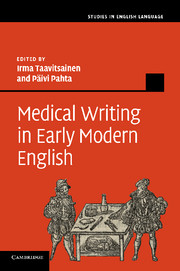Book contents
- Frontmatter
- Contents
- List of plates
- List of figures
- List of tables
- Notes on contributors
- Preface
- List of abbreviations
- 1 An interdisciplinary approach to medical writing in Early Modern English
- 2 Medical texts in 1500–1700 and the corpus of Early Modern English Medical Texts
- 3 Medical literacies and medical culture in early modern England
- 4 Verbs of knowing: discursive practices in early modern vernacular medicine
- 5 Defining in Early Modern English medical texts
- 6 Dissemination and appropriation of medical knowledge: humoral theory in Early Modern English medical writing and lay texts
- 7 Code-switching in Early Modern English medical writing
- 8 New arguments for new audiences: a corpus-based analysis of interpersonal strategies in Early Modern English medical recipes
- 9 Efficacy phrases in Early Modern English medical recipes
- 10 Medical pamphlets: controversy and advertising
- 11 The development of specialized discourse in the Philosophical Transactions
- 12 The expression of stance in early (1665–1712) publications of the Philosophical Transactions and other contemporary medical prose: innovations in a pioneering discourse
- Appendix A Raw data tables corresponding to Figures 4.3–4.14
- Appendix B Raw data tables corresponding to Figures 8.1–8.4
- Appendix C Stance markers used in the analysis in Chapter 12
- Appendix D Preliminary list of texts in the corpus of Early Modern English Medical Texts (EMEMT)
- Bibliography
- Index
5 - Defining in Early Modern English medical texts
Published online by Cambridge University Press: 03 May 2011
- Frontmatter
- Contents
- List of plates
- List of figures
- List of tables
- Notes on contributors
- Preface
- List of abbreviations
- 1 An interdisciplinary approach to medical writing in Early Modern English
- 2 Medical texts in 1500–1700 and the corpus of Early Modern English Medical Texts
- 3 Medical literacies and medical culture in early modern England
- 4 Verbs of knowing: discursive practices in early modern vernacular medicine
- 5 Defining in Early Modern English medical texts
- 6 Dissemination and appropriation of medical knowledge: humoral theory in Early Modern English medical writing and lay texts
- 7 Code-switching in Early Modern English medical writing
- 8 New arguments for new audiences: a corpus-based analysis of interpersonal strategies in Early Modern English medical recipes
- 9 Efficacy phrases in Early Modern English medical recipes
- 10 Medical pamphlets: controversy and advertising
- 11 The development of specialized discourse in the Philosophical Transactions
- 12 The expression of stance in early (1665–1712) publications of the Philosophical Transactions and other contemporary medical prose: innovations in a pioneering discourse
- Appendix A Raw data tables corresponding to Figures 4.3–4.14
- Appendix B Raw data tables corresponding to Figures 8.1–8.4
- Appendix C Stance markers used in the analysis in Chapter 12
- Appendix D Preliminary list of texts in the corpus of Early Modern English Medical Texts (EMEMT)
- Bibliography
- Index
Summary
Aims
In An Essay Concerning Human Understanding (1690), John Locke describes an encounter with a group of physicians immersed in learned debate about liquor in the nerves, a debate which captures the importance of definitions in medicine:
the Debate having been managed … by variety of Arguments on both sides, I (who had been used to suspect, that the greatest part of Disputes were more about the signification of Words than a real difference in the Conception of Things) desired … they would first examine … what the Word Liquor signified … upon Examination found, that the signification of that Word was not so settled and certain, as they had all imagined; but that each of them made it a sign of a different complex Idea. This made them perceive, that the Main of their Dispute was about the signification of that Term; and that they differed very little in their Opinions, concerning some fluid and subtile Matter, passing through the Conduits of the Nerves; though it was not so easie to agree, whether it was to be called Liquor
(Locke 1997 iii, ix, 16)The ‘examination’ of the meaning of ‘liquor’ by these seventeenth-century physicians probably involved further discussion, rather than reference to dictionaries, which were available, but far from ubiquitous – and many would not have been helpful with a word as common as ‘liquor’.
- Type
- Chapter
- Information
- Medical Writing in Early Modern English , pp. 74 - 93Publisher: Cambridge University PressPrint publication year: 2011



